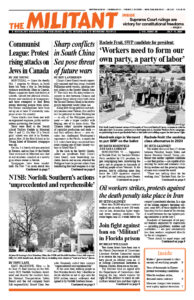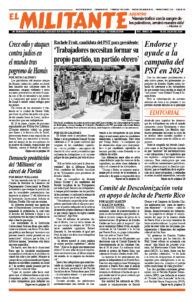Two dozen letters have been sent to the Florida Department of Corrections Literature Review Committee urging it to reverse the ban prison authorities have placed on Militant issue no. 17 at Jackson Correctional Institution in Malone, Florida. More are on the way.
The Militant filed an appeal with the Department of Corrections challenging the ban, which violates the right of the Militant to reach its subscribers behind bars and their right to read what they choose.
The Militant was informed May 17 by Jackson Correctional Institution authorities that they had impounded that issue, dated April 29, for running a photo that “shows dead person being paraded around on a motorcycle.” The authorities claim that the photo and the Militant itself “depict hatred toward a specific race.”
In fact, this widely circulated Associated Press picture accompanied an article in the paper opposing Jew-hatred. It shows the body of a Jewish man murdered by Hamas during its deadly Oct. 7 pogrom in Israel being driven around Gaza City to cheers by the Islamist group’s supporters.
“Far from depicting hatred toward any race, the Militant calls for uniting Jewish, Arab, immigrant and other workers to defend their common class interests,” said Militant editor John Studer.
Prison authorities claim the photo is “dangerously inflammatory” and violates prison rules, including the encouragement of “riot, insurrection, rebellion” and “organized prison protest.”
“Nothing in the photo, even standing alone, could possibly be construed as advocating or encouraging riot, insurrection, etc.,” writes Militant attorney David Goldstein in appealing the paper’s impoundment.
“The question here,” Goldstein writes, should not be about the “objectively false accusation that the ‘Magazine depict[s] hatred toward a specific race,’ but why Jackson was so determined in the first place to prevent its inmates from reading articles that condemn Hamas’ atrocities, the Iranian government, and anti-Semitism.”
“The U.S. Constitution is violated by your ruling,” David Menefee, secretary-treasurer/business agent for Bakery, Confectionery, Tobacco Workers and Grain Millers Local 111 in Fort Worth, Texas, wrote to prison authorities July 1. “The freedoms contained in it are necessary and must be defended at all costs, including freedom of speech and freedom of the press. To that end, you must reverse your action and allow subscribing inmates to receive the Militant without interference.”
Petitions from workers at BCTGM-organized plants calling for overturning the ban have been sent to the Literature Review Committee from over a dozen workers in Grand Prairie, Texas, and a BCTGM-organized plant in Chicago, among others.
“We demand you reverse the banning of the Militant and let prisoners read literature of their choice,” said the letter signed by five BCTGM Local 1 members in Chicago.
Letters demanding the ban be lifted have come from the American Civil Liberties Union Florida; Florida Press Association; Reporters Committee for Freedom of the Press; PEN America; Amnesty International; Inna Stravitsky, former president of the Holocaust Memorial Committee of Brooklyn; and Mark Lee, financial secretary/treasurer of BCTGM Local 57 in Mount Gilead, Ohio.
The ban is “an unconstitutional violation of the First Amendment rights to free speech,” wrote Carl Weinberg, Executive Committee member of American Association of University Professors/American Federation of Teachers union in Bloomington, Indiana. “Prisoners everywhere (and all Americans) have the right to receive information of their choosing. Please reverse the impoundment of issue no. 17.”
Letters can be emailed to Saritza.Legault@fdc.myflorida.com or sent to the Florida Department of Corrections, Literature Review Committee, 501 South Calhoun St., Tallahassee, FL 32399-2500, with copies to themilitant@mac.com.

